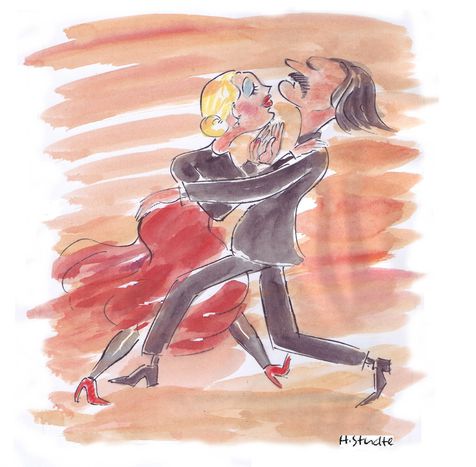
It takes two to tango
Published on
Translation by:
Hanna SankowskaA selection of dance-related pan-European expressions will have people dancing 'on graves' in the UK, 'around noses' or 'in many weddings' in Germany or 'with the ugliest' in Spain - but what do all these sayings and proverbs mean? Jumpity idiom of the week
Darcy: 'So what do you recommend to encourage affection?' Elizabeth Bennett: 'Dancing. Even if one's partner is barely tolerable'
(from Jane Austen's Pride and Prejudice, 1813)
Ouch. Dance, one would think, is a pleasant thing. An all-singing all-dancing person in the Anglophone part of the world is someone who is in good shape and humour. In Poland dance is likewise associated with vitality, livelihood, so also with youth. Dla młodych taniec, dla starych różaniec literally means dancing for the young, rosary for the old. It’s a sad vision, which is why you should enjoy life while you can.
The Germans do so by having many partners: they call it dancing in many weddings (auf mehreren Hochzeiten tanzen), which is the English equivalent of having your cake and eating it. A Pole would remark that those Germans gave it all they got by 'dancing the tango' (Poszedł w tango), whilst the Brits would respond comprehensively that it takes two to tango.
The Germans must be a careful lot in general though; they wouldn't 'let someone dance all around their nose' (Jemanden auf der Nase herumtanzen), or be walked all over. The Poles also warn you about dancing in life - W życiu jak w tańcu - każdy krok się liczy - because as in dancing, every step is important. One false step and you'll be in the dance (essere in bailo) - you will find yourself in an unpleasant or difficult situation, the Italians explain, and you might get dragged into something: tirare in ballo. Meanwhile, a Spaniard would complain if they got the worst or the ugliest dancer: bailo con la más fea (I dance with the ugliest). Of course, a Brit could accuse them of exaggerating and making a song and dance about it. Not all attempts to explain your mistakes are justified, goes a famous Polish proverb: złej baletnicy nawet rąbek spódnicy przeszkadza- a bad dancer blames thehem ofher skirt (a bad workman always blames his tools).
Translated from Na pobudzenie zmysłów



